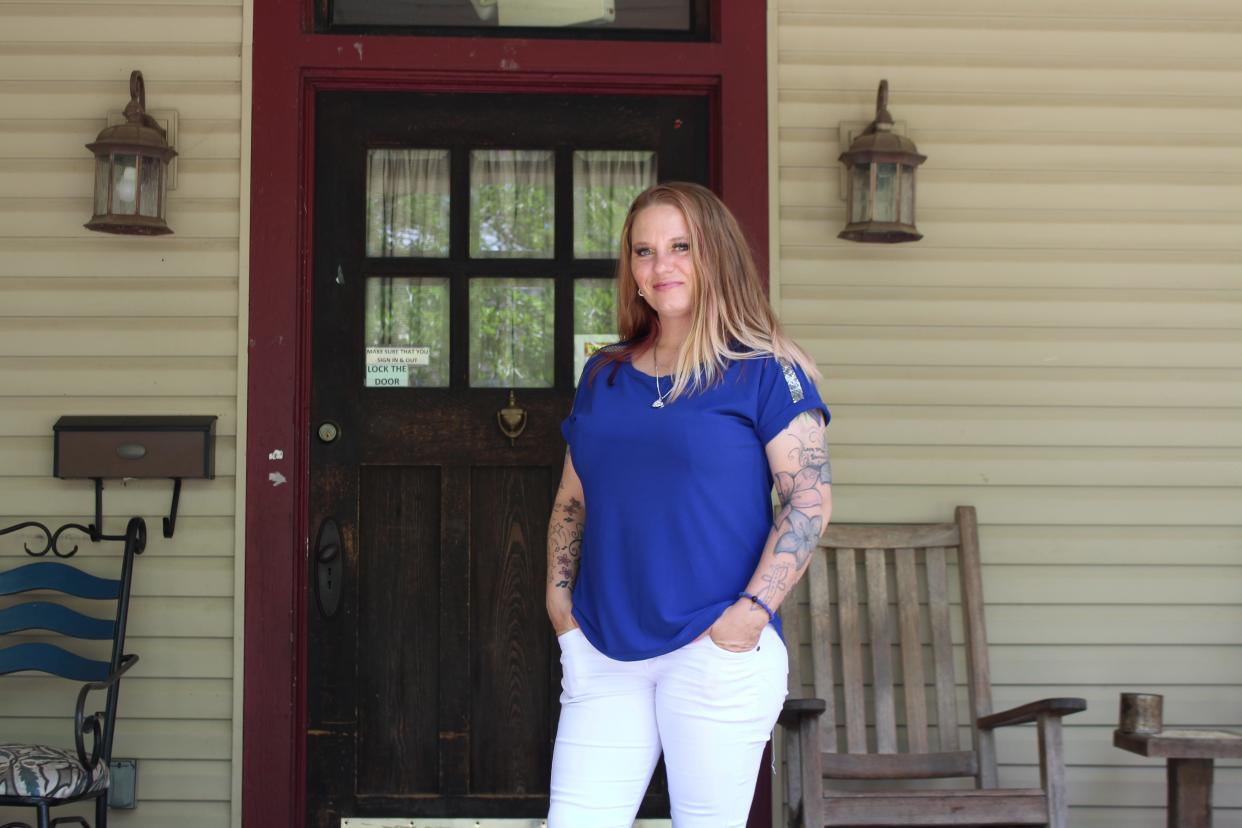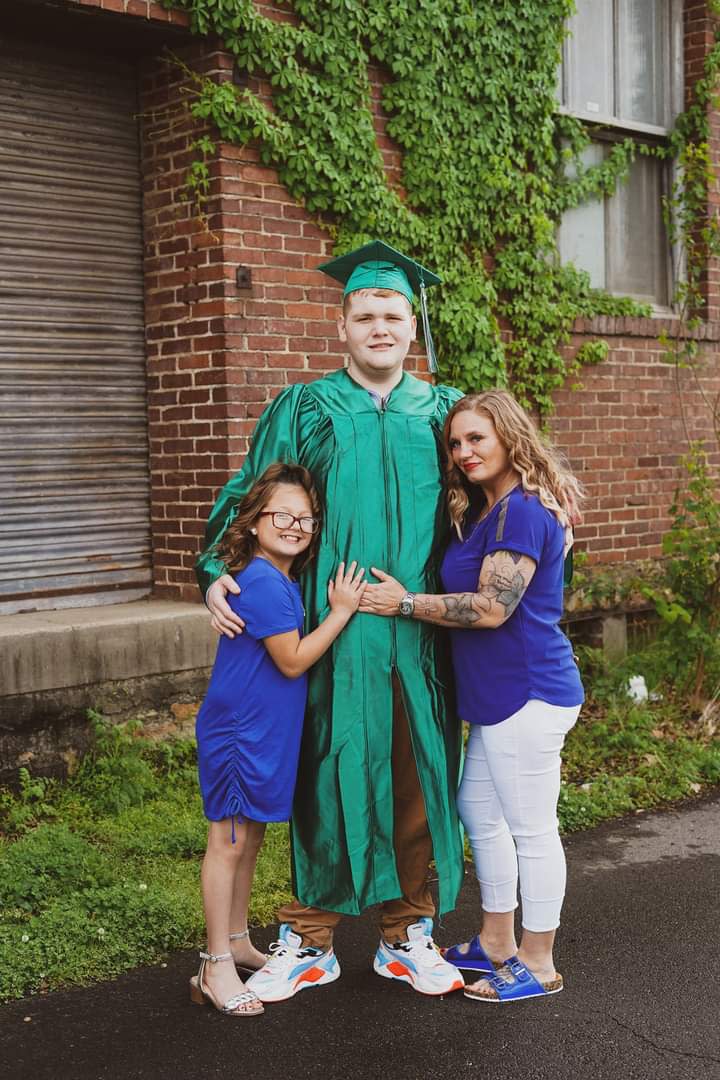'It's not impossible': Next Step transitional house manager shares story of life change

Crystal Sallis knows what it is like to live in the dark.
Everything about her that is bright, from the joy in her voice to her color-coordinated outfit, stands in sharp contrast to the battles she has fought over the past year.
Sallis, 48, recalls the hopelessness she felt without her children and without a home.
“Once I got it all back, and where I’m at now, I just feel like I’ve built a life that I’m not willing to lose,” she said.
After years of struggling with addiction and cycling in and out of prison since she was 23, Sallis found a path forward at the Esther Home, a residence providing shelter and support for women and their children experiencing homelessness.
The two-story house is one of three group homes in Next Step’s transitional housing program, which also includes multiple single-family homes, apartments and a duplex around Fort Smith.
A new beginning
About three weeks after Sallis got out of prison in February 2021 and entered parole, she moved into the Esther Home.
It was a completely fresh start. She had no birth certificate, no driver's license, no social security card.
Residents in the transitional housing program have their rent, utilities, food and other necessities paid for, allowing them to save up money for things like applications and down payments for a place to rent.
Next Step staff also provide case management and additional services to help connect residents with employment.
With the basic needs of housing and food met, Sallis was able to move from surviving to thriving as she radically transformed her life in six months.
Along with saving her earnings from working at Sonic, Sallis and her case manager Karina Diaz set goals, including obtaining personal documents, regaining custody of her two children and getting her driver’s license.
“In May, I had quite enough money saved. I went and got a lawyer, got my kids back,” Sallis said, adding that her daughter, Braelynn Brown, 9, moved in with her at the Esther Home.
Her son, Briceon McMahand, 18, stayed with an aunt because he was too old to live in the home.
“I had to prove it to myself that I could do it right along with everyone else,” Sallis said. “When my kids got taken, that did it. It hurt them and it hurt me, but had I not had that hurt, I don’t believe I would have fought so hard.”
In June 2021, Sallis became the house manager at the Esther Home, allowing to her step into a leadership role by connecting with residents and offering support such as rides and maintaining the supply list.
Karina Diaz, a case manager at Next Step Homeless Services, described Sallis’ journey as amazing and encouraged others to see her transformation as possible for themselves, too.
“Right now, what they’re facing is tough, but it’s only temporary,” Diaz said. “They can always get to that place that they want to be if they just make steps. That's why I’m here.”
Reunification
Residents typically stay in Next Step’s transitional housing program for about six months, and in September, Sallis began looking for housing to reunite with her children all under one roof.
On top of the many challenges of today’s housing market, Sallis faced additional obstacles due to her background.
She lost her housing assistance from the U.S. Department of Housing and Urban Development due to her drug charges and would have to wait three years to be approved. Instead, she found a duplex at the Van Buren Housing Authority where she and her children moved in October.

Over the past year, Sallis has worked to earn her children’s trust back.
She attends all her daughter's school events and has pushed her son to catch up on credits to graduate high school. With Sallis’ support, McMahand took classes virtually and will graduate from Van Buren High School May 20.
“They don’t have to live in fear. They don’t have to worry ‘Is mom coming home tonight?’ because that was so, so big for them back then,” Sallis said. “I have a lot of things I have to make up for, but I’ve also learned I’m not their friend. I’m their parent, and I can’t parent out of guilt.”
McMahand said of his mom, “I’m proud of her. She’s made a difference, a change.”
On the same journey
The joy of having a home with her children was tinged with sadness as Sallis recognized she would have to give up her position as house manager for the Esther Home.
“I was devastated,” she said. “I thought I was going to lose my job … because I wasn’t living there, and I really love that job.”
When Sallis met with her case manager Karina Diaz and assistant director Sara Gray to gather her savings for the move in October, they surprised her with even better news – she would be able to keep the part-time role.
"It’s a joy that I’ve never felt,” Sallis said. “I can’t describe the softness in my heart that I have for others who are just like me … I feel like I have grown a trusting relationship with these women because of my actions.”
Sallis is also planning to apply to become a recovery coach at the Gateway Recovery Center where she completed classes.
“I want them to see that it’s possible,” Sallis said. “In addiction and where we were at, nothing was possible. There was no faith, there was no hope. It was very dark. When they have someone in their lives that they see and know where that person came from and how far they came, it gives them hope automatically.
“Being able to talk to someone who knows exactly where they’re at and understands them completely with no judgment is a big deal for us,” she said. “It’s hard to find those kinds of people, especially the ones that have beat it.”
A home of her own
In the future, Sallis wants to have a place where her kids “always have a home to come back to.” She is currently looking for a place to rent to own.
Like many people with felonies, barriers to stable housing include application waiting periods after being incarcerated.
Sallis said she has had multiple landlords say it will be three to five years before they will consider her as a tenant. She tells people facing similar circumstances to not give up because they are trying to do the right thing for themselves and their families.
“When you’re doing the right thing, the right things fall into place for you,” she said.
The connection between housing instability and criminalization, also called the homelessness-jail cycle, shows how people who are unsheltered often have more interactions with the police. These barriers also prevent people with felonies from obtaining rental housing to move forward with their lives.
Sallis said that one possible solution to these barriers could be looking at more than what is on a paper application, including whether a person has stable employment, co-signers and character witnesses.
The Urban Institute recommends housing-first initiatives to break the homelessness-jail cycle, ones that “connect people with stable housing with no preconditions so that they can improve other aspects of their lives.”
Next Step has been approved by the city to bring a housing-first program to Fort Smith in the form of a non-congregate housing community.
This new opportunity, connected with the nonprofit’s transitional housing program, will open the door for more people to experience a transformation like Sallis.
“Repeat offenders like myself, they feel like that’s their only way to live … but when you get tired and enough’s enough, it’s just a different feeling when you fight harder to get where you want,” she said. “It’s not easy by no means, but it’s not impossible.”
This article originally appeared on Fort Smith Times Record: Next Step Homeless Services' transitional housing changes lives

